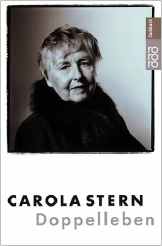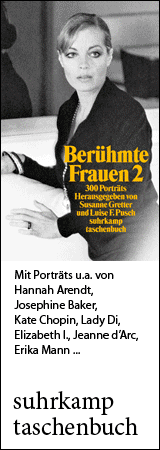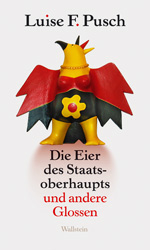
(actual name Erika Zöger, née Assmus)
born on November 14, 1925, in Ahlbeck on the island of Usedom, Germany
died on January 19, 2006, in Berlin, Germany
German political journalist, radio editor, and author
100th birthday on November 14, 2025
Biography
“Who am I? Someone who has had almost as many names as professions! People knew me as a farm worker in the Eichsfeld region and as a teacher in the Markian district, as a librarian at a rocket research institute in the southern Harz mountains and as a party functionary in Potsdam and Kleinmachnow, and then as a student, assistant, and journalist in West Berlin. In Cologne, I was an editor at a publishing house, a co-founder of a magazine, and spent my happiest professional years at WDR. I had always written, but I didn’t decide to become a writer until after I retired.“
These are the opening sentences in Carola Stern’s Doppelleben (Double Life, 2001). Nobody knew that she had actually also worked in espionage until she revealed in the autobiography that she had spied for the Americans.
Erika Assmus, who decided to call herself Carola Stern at the beginning of her career in journalism in the 1950s, grew up on the Baltic island of Usedom. Her mother was the owner of a guest house; her father died before Erika was born. He had sent his wife to Berlin for an abortion four times, but on the fifth occasion she refused – and so Erika was born.
“Eka,” just seven years old at the beginning of the Nazi dictatorship, became an enthusiastic member of the BDM (Bund Deutscher Mädel, League of German Girls) and a youth leader in her hometown, the seaside resort of Ahlbeck. After the war, she trained as a teacher in the Soviet-occupied zone and was recruited as a spy by the Americans, who in return organized medical help for her terminally ill mother. Erika fled to West Berlin when she was at risk of being exposed as a spy. Her intimate knowledge of the political system of the young GDR soon paid off: the talented student became an assistant at the newly founded Institute for Political Science, Soviet Zone Department.
She travelled to the United States and spent some time in London in the charmingly chaotic household of the poet Erich Fried, who was still unknown at the time. In the summer of 1959, she suffered a breakdown, stayed in psychiatric clinics, and experienced “the most serious crisis of her life” – we don't learn much more than that.
In the 1960s, she became lead editor of the political department at Kiepenheuer & Witsch and, together with other committed contemporaries, founded the German section of Amnesty International. From 1970, she was an editor at WDR and also appeared on television as a political commentator – as so often the only woman among all the men – who was highly regarded by many for her courage and independence. She described these 15 years as the happiest of her life. At the age of 60, the retiree then launched her very successful career as an author of women's biographies – including two on her own life. In den Netzen der Erinnerung (In the Nets of Memory) is a double biography in which she reflected on her very diverse pasts together with her husband Heinz Zöger, who, as a communist, spent many years in Nazi prisons and later also in those of his “comrades” in the GDR. She summed up the reactions of the public and critics as follows: “It seems that at that time there were only two Nazis in Germany – Hitler and me.”
Doppelleben provides a detailed, colorful, and often humorous account of the period from 1945 to 2000, during which a German woman developed from a BDM girl to an East German functionary and finally to an astute journalist and writer whose commentaries on the last century were both insightful and self-critical.
•••••••••••••
In June 2000, several months before her 75th birthday, I interviewed Carola Stern. Linking two of her main areas of activity, I asked: “Ms. Stern, as co-founder of the German section of Amnesty International, what do you think about organizations such as Amnesty International for Women or Terre des Femmes alongside Terre des Hommes?”
Her response was immediate, vehement and very decisive: “I’m against that. It's completely unnecessary, such a division is actually stupid and extremely aggravating!” She said that Amnesty had always stood up for people, regardless of gender.
I disagreed and pointed out that the catastrophic situation of women under the Taliban or the systematic rapes in the Balkan War demonstrated that there was a very specific, systemic violence committed by men against women that also required specific countermeasures.
No, she replied, she could not agree with that at all.
Carola Stern had been quite mistaken once before in her life. She was no longer able to write the book in which, self-critical as always, she would have distanced herself from this error as well.
(Text from 2004; translated with DeepL.com; edited by Ramona Fararo, 2025.
Please consult the German version for additional information, pictures, sources, videos, and bibliography.)
Author: Luise F. Pusch
If you hold the rights to one or more of the images on this page and object to its/their appearance here, please contact Fembio.



